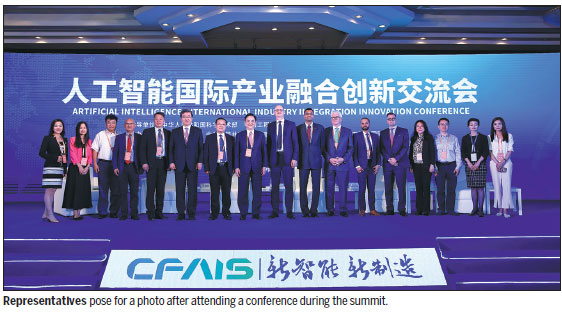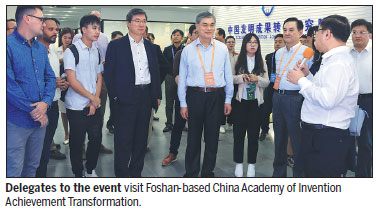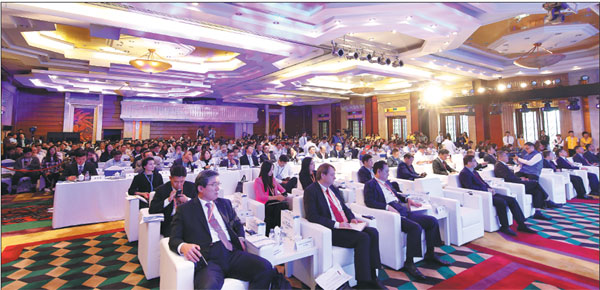Foshan forges ahead with innovative industrial development
Integration of artificial intelligence is creating international opportunities for city, Chen Hong reports.
Foshan, one of China's main manufacturing hubs, is to further sharpen its competitiveness with the widespread application of the latest artificial intelligent technologies in its bid to become a world industrial leader. That was the consensus of many academicians and scholars at the recent 2018 China Foshan Global Artificial Intelligence and Intelligent Manufacturing Summit.

Kiran J. Fernandes, a professor at Durham University Business School, said Foshan's strong manufacturing foundation made it possible for the city to become a key global player after an AI-led industrial upgrade, similar to that Germany and the United Kingdom experienced during the industrial revolution.
He added that the advantageous location of the city - in the heart of Guangdong-Hong Kong-Macao Greater Bay area, one of China's most important strategic locations for technological innovation - can better link the city with the world in order to fulfill its mission.
The 2018 China Foshan Global AI& Intelligent Manufacturing Summit, which was held from Oct 29 to 31, invited academicians and industrial leaders from China, the United States, the UK, Germany and South Korea to discuss the trends and opportunities in intelligent manufacturing globally and how to integrate AI with the industry in Foshan.
Nicky Lu, an academician from the National Academy of Engineering of the United States and CEO of Taiwan's Etron Technology, said he was amazed by the manufacturing capability of Foshan, and said it will have a brilliant future.
In his speech, Lu said he believed the combination of a "holistically integrated approach" and AI will result in explosive growth worldwide, which will also benefit Foshan.
Pan Yunhe, an academician with the Chinese Academy of Engineering, said China has entered a generation of AI 2.0 and new demand has continued to prop up the development of the industry.
"Demand emerged in 2017 when the manufacturing, medicine and transportation sectors needed intelligent systems rather than a smart computer," he said.
The information environment has also changed along with new technologies and products such as mobile computing, supercomputing, wearable equipment and search engines, which have also affected the development of AI, Pan said.
Foshan, China's only pilot city to experiment with the transformation and upgrading of manufacturing, will stick to intelligent manufacturing and focus on introducing technology to emerging industries such as electronics, new-energy vehicles, biomedicines and new materials, said Deputy Mayor Tan Ping at the summit.
Traditionally, the city has led the country in the sectors of machinery manufacturing, textiles and apparel, furniture as well as ceramics and building materials.
Liu Taogen, director of Foshan National High-tech Industrial Development Zone, said the intensive integration of new-generation AI technology with advanced manufacturing technology will promote a new industrial revolution.
"The summit is a great opportunity for Foshan and will help the city develop a creative mode that puts the technology and intelligent manufacturing of Foshan and the worldwide market together," Liu said.
As an organizer of the summit, the development zone has been a core part of the city that supports intelligent manufacturing.
It has attracted more than 50 industrial robot manufacturers, including world and national leaders such as Wuhan Huazhong Numerical Control Co, Estun Automation and Yaskawa, according to Liu.
Yang Jun, deputy director of the Department of Science and Technology of Guangdong, said the province issued a government plan on July 23, revealing its ambition to become a leading national destination for new-generation AI industry development.
"The industrial output of the core AI industry in Guangdong reached 26 billion yuan ($3.78 billion) in 2017, accounting for nearly one third of the country's total," Yang said.
As a result, boosted by the development of the AI industry, the industrial output for robotic and intelligent equipment surpassed 200 billion yuan, he added.
Yang noted that Foshan will make an even bigger contribution in the future.
Qian Weiqiang, president of the China Academy of Invention Achievement Transformation, one of the organizers of the event, said his academy will cooperate with Foshan High-Tech Zone and other organizations to introduce more resources, projects and talented people from Beijing's Zhongguancu, Hong Kong, Macao, Taiwan and overseas after the event, to promote the long-term industrial development in Foshan.
Contact the writer at chenhong@chinadaily.com.cn
|
Participants from home and abroad meet and exchange ideas during the China Foshan Global AI & Intelligent Manufacturing Summit.Photos Provided To China Daily |


(China Daily 11/03/2018 page6)















